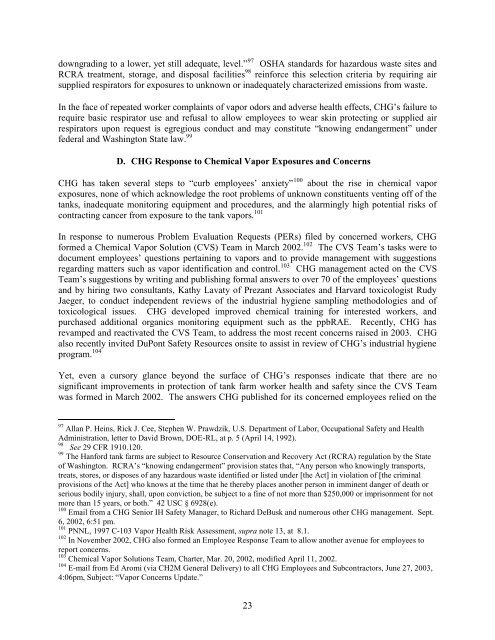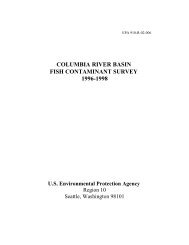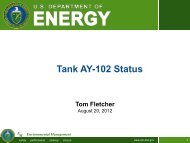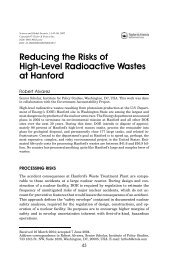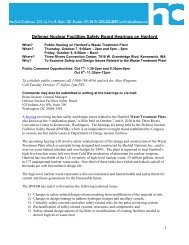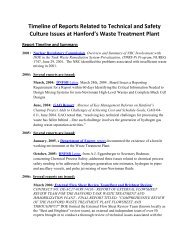Knowing Endangerment - Hanford Challenge
Knowing Endangerment - Hanford Challenge
Knowing Endangerment - Hanford Challenge
You also want an ePaper? Increase the reach of your titles
YUMPU automatically turns print PDFs into web optimized ePapers that Google loves.
downgrading to a lower, yet still adequate, level.” 97 OSHA standards for hazardous waste sites and<br />
RCRA treatment, storage, and disposal facilities 98 reinforce this selection criteria by requiring air<br />
supplied respirators for exposures to unknown or inadequately characterized emissions from waste.<br />
In the face of repeated worker complaints of vapor odors and adverse health effects, CHG‟s failure to<br />
require basic respirator use and refusal to allow employees to wear skin protecting or supplied air<br />
respirators upon request is egregious conduct and may constitute “knowing endangerment” under<br />
federal and Washington State law. 99<br />
D. CHG Response to Chemical Vapor Exposures and Concerns<br />
CHG has taken several steps to “curb employees‟ anxiety” 100 about the rise in chemical vapor<br />
exposures, none of which acknowledge the root problems of unknown constituents venting off of the<br />
tanks, inadequate monitoring equipment and procedures, and the alarmingly high potential risks of<br />
contracting cancer from exposure to the tank vapors. 101<br />
In response to numerous Problem Evaluation Requests (PERs) filed by concerned workers, CHG<br />
formed a Chemical Vapor Solution (CVS) Team in March 2002. 102 The CVS Team‟s tasks were to<br />
document employees‟ questions pertaining to vapors and to provide management with suggestions<br />
regarding matters such as vapor identification and control. 103 CHG management acted on the CVS<br />
Team‟s suggestions by writing and publishing formal answers to over 70 of the employees‟ questions<br />
and by hiring two consultants, Kathy Lavaty of Prezant Associates and Harvard toxicologist Rudy<br />
Jaeger, to conduct independent reviews of the industrial hygiene sampling methodologies and of<br />
toxicological issues. CHG developed improved chemical training for interested workers, and<br />
purchased additional organics monitoring equipment such as the ppbRAE. Recently, CHG has<br />
revamped and reactivated the CVS Team, to address the most recent concerns raised in 2003. CHG<br />
also recently invited DuPont Safety Resources onsite to assist in review of CHG‟s industrial hygiene<br />
program. 104<br />
Yet, even a cursory glance beyond the surface of CHG‟s responses indicate that there are no<br />
significant improvements in protection of tank farm worker health and safety since the CVS Team<br />
was formed in March 2002. The answers CHG published for its concerned employees relied on the<br />
97 Allan P. Heins, Rick J. Cee, Stephen W. Prawdzik, U.S. Department of Labor, Occupational Safety and Health<br />
Administration, letter to David Brown, DOE-RL, at p. 5 (April 14, 1992).<br />
98<br />
See 29 CFR 1910.120.<br />
99<br />
The <strong>Hanford</strong> tank farms are subject to Resource Conservation and Recovery Act (RCRA) regulation by the State<br />
of Washington. RCRA‟s “knowing endangerment” provision states that, “Any person who knowingly transports,<br />
treats, stores, or disposes of any hazardous waste identified or listed under [the Act] in violation of [the criminal<br />
provisions of the Act] who knows at the time that he thereby places another person in imminent danger of death or<br />
serious bodily injury, shall, upon conviction, be subject to a fine of not more than $250,000 or imprisonment for not<br />
more than 15 years, or both.” 42 USC § 6928(e).<br />
100 Email from a CHG Senior IH Safety Manager, to Richard DeBusk and numerous other CHG management. Sept.<br />
6, 2002, 6:51 pm.<br />
101 PNNL, 1997 C-103 Vapor Health Risk Assessment, supra note 13, at 8.1.<br />
102 In November 2002, CHG also formed an Employee Response Team to allow another avenue for employees to<br />
report concerns.<br />
103 Chemical Vapor Solutions Team, Charter, Mar. 20, 2002, modified April 11, 2002.<br />
104 E-mail from Ed Aromi (via CH2M General Delivery) to all CHG Employees and Subcontractors, June 27, 2003,<br />
4:06pm, Subject: “Vapor Concerns Update.”<br />
23


